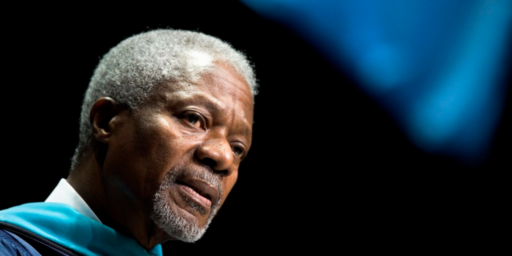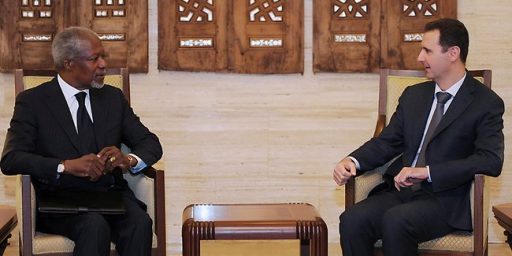FIXING THE U.N.
Donald Sensing has some thoughts on the matter, inspired by Kofi Annan’s statement today that the U.N.’s structure needs work:
Mr. Annan indicated that he would favor expanding the number of permanent Council members, now five nations, each with veto power, and the elected membership, 10 countries serving staggered two-year terms.
In a report issued shortly before the news conference, Mr. Annan said the decisions of the Security Council increasingly “lack legitimacy in the eyes of the developing world, which feels that its views and interests are insufficiently represented among the decision makers.”
He added, “Legitimacy of action, which may include military action, is essential to ensuring durable solutions to the security needs of our time.”
Mr. Annan was also direct in his remarks about the work of the General Assembly, in which all 191 member nations are represented.
“Repetitive and sterile debates often crowd out the items that really matter,” he said in the report. “Decisions can often be reached only on a lower-common-denominator basis and, once reached, command little or no attention beyond the confines of the General Assembly chamber.”
Don correctly notes the problem with this line of thought:
If 14 nations on the UNSC are usually paralyzed into inactivity, what dynamism does Annan expect the council to have with, say, three more permanent members and seven more elected members?
Indeed. Not to mention, as I’ve noted before, re-designing the Security Council is a Pandora’s Box not worth opening. Don also contends,
The chief problem with the United Nations is not that the UNSC is too small or needs more members. Its chief problem is that it no longer stands for freedom, democracy and economic development in the world. It has too many members, not too few, and oppressive regimes, authoritarian governments and undemocratic oligarchies have an equal voice in world affairs as democratic nations. <...> A top-to-bottom reform not only of its structure but also of the qualifications of membership is needed. Non-democratic states should have only non-voting representation. Membership on the UNSC should be restricted only to democratic states.
It’ll never happen, of course. So it is really time for another Great Power Summit to establish a replacement organization. Of course, that won’t happen either, so nothing will change except some minor details on the organization chart. If that.
Interesting. I agree that treating all states equally is problematic. But some weight has to be given to power rather than just regime type. I’m not sure a world alliance that excluded Russia*, China, and the entire Middle East except arguably Israel would have a lot of value. We already have NATO. And, for that matter, France and Germany, both democracies, worked against us in the Iraq venture.
Giving tiny countries the same voting power in the General Assembly as the major powers and treating rogue regimes as if they were legitimate (giving Libya chairmanship of the Human Rights Commission, for example) are both rather problematic. They certainly make consensus virtually unachievable. But I don’t know what the alternative is, aside from eschewing the collective model altogether. And, as tiresome as it can be, it is quite often useful to have the U.N. as a policy vehicle. But because of all these problems, it is also necessary to maintain the ability to operate independently of that body as well.
*It occurs to me that Russia is nominally democratic and has elections that more or less mean something. But the President has virtually dictatorial powers and the institutions of civil liberties are woefully undeveloped.






Don hits a home run when he says:
The chief problem with the United Nations is not that the UNSC is too small or needs more members. Its chief problem is that it no longer stands for freedom, democracy and economic development in the world.
Even trying to put on my “even handed globalist” hat, I am sort of at a lost to see how the U.N. is repairable. Adding more members to the UNSC is hardly going in the right direction.
BTW- Russia no longer has elections quite as free as you mentioned. Yesterday there was a news story about how the government banned the media from saying anything bad about a candidate running for office. Shades of the soviet empire.
Paul
how about reducing veto power to a “half veto” so you need two to block or exchanging them into the right to several votes. In exchange, why not set up an independent body rating democracy and determining probability to be on the council based on the ranking. Same with human rights and so on.
Nobody could complain they don’t get to be on the council as the probability doesn’t fall to zero (just really, really small) and everyone knows exactly how to improve their chances to be on the councils.
I know it won’t work just like that, but I think my idea is at least applicaple to the human rights council.
Paul: I’m not sure that it has ever stood for freedom and democracy. Don notes that this was the original intention when its membership consisted only of four great powers during WWII, but it hasn’t been the case since the actual organization formed under the Charter. The UN isn’t of much value as a collective security mechanism, but is sometimes useful for peacekeeping and humanitarian aid missions.
Markus: The point of the veto is so that the great powers can’t be forced to do anything by the U.N. As a practical matter, they can’t anyway.
“And, for that matter, France and Germany, both democracies, worked against us in the Iraq venture.”
James, I have to take gentle exception to the apparent implication that the only proper participants are those who support the US on every issue. I’m as outraged as the next guy over those two countries’ ridiculous stances in Iraq, but that shouldn’t disqualify them from being heard in a worldwide forum.
Nevertheless, I agree that the UN is beyond repair.
Eric: I agree. My point is that, even if only democracies were allowed to participate, there would still be substantial disagreeement.
—